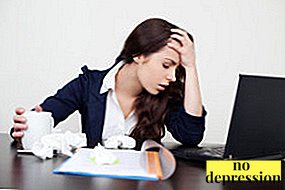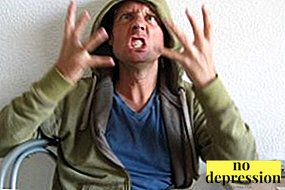The modern world dictates its own conditions to a person, forcing him to get used to the fast pace of life and the kaleidoscope of diverse tasks.
All this leads to depletion of internal resources and stress.
Concept definition

What is stress? The first to justify the concept of "stress" was an endocrinologist of Canadian origin Hans Selye.
It was he who explained the causes and mechanisms of this phenomenon.
Stress - This is the state of the body (both emotionally and physically), which is the reaction to aggressive, difficult and uncontrolled human demands of the external environment.
Stress is manifested in the form of exhaustion, tension, depressed state and a number of other negative feelings.
Psychology
The psychology of stress stems from human reaction to a non-standard situation and the inability to cope with the negative (and in some cases, with strong positive) emotions that surged in as a result.
In the face of an imminent threat, the standard set of emotions gives way to strong anxiety, which causes disruptions on a physiological and psychological level.
Irritant can be any (fear, anger, pain, envy, a sense of inferiority, etc.). At the same time, the stimulus does not have to be real, since the stress mechanism is activated even when a person expects a threat or think of it as potentially possible.

Under stress, a person can control his own behavior, make informed decisions and analyze the situation.
Complex body reactions on the stimulus flow in the background.
Hans Selye described three stages of stress development:
- Anxiety. The person feels the growing tension, but still feels good on the moral and physical level. The body activates internal resources and goes into a stage of adaptation, readiness for a long overcoming of difficulties. At this stage psychosomatic failures in the body's work (migraine, allergic reactions, gastric ulcers) may appear.
- Resistance. The transition to the second stage occurs if the stressful situation does not exhaust itself for a long time. The internal resources of the body are gradually running out. It is more difficult for a person to mobilize forces to cope with difficulties, fatigue makes itself felt.
The psyche is exposed to the destructive effects of stress. This leads to a loss of control.
- Depletion. Moral and physical strength is running out, a person can no longer withstand the long-term effects of an irritant. The body "disables" the protective function for lack of resources.
 Now, help is only possible from the outside, in the form of supporting or eliminating an annoying factor.
Now, help is only possible from the outside, in the form of supporting or eliminating an annoying factor.
Stress scenario is fixed still in childhood.
In adulthood, a person reproduces it in the same form that was learned in the early stages of life.
What are the stresses?
Stress can have various causes and nature. There are many classifications of this phenomenon, but traditionally distinguish:
- Psychological stress. It is the result of strong emotional experiences and can occur both for positive reasons (wedding, winning the competition, promotion, etc.), and for negative (illness of a loved one, dismissal, the threat of bankruptcy, etc.).
Psychological stress can develop without objective reasons, on the basis of fantasy.
- Physiological stress. Reaction to an aggressive environment that delivers physical discomfort (heat, cold, hunger, injury, etc.).
- Short stress. Occurs during fast and short exposure to an irritant that does not pose a potential hazard to humans.
 In this case, the body is restored by itself, disabling the protective functions. A vivid example is the awakening to the harsh sounds. In the first few seconds, the person is frightened and agitated, but after analyzing the situation, he calms down and relaxes.
In this case, the body is restored by itself, disabling the protective functions. A vivid example is the awakening to the harsh sounds. In the first few seconds, the person is frightened and agitated, but after analyzing the situation, he calms down and relaxes. - Chronic stress. The most dangerous for the body type, which does not pass through the self-regulation of the body. It may occur after a severe traumatic event, to which a person periodically mentally returns, plunging into the appropriate state (accidents, catastrophes, attacks, etc.).
In addition to these types of stress is also divided into:
- traumatic;
- post-traumatic.
Based on the emotional background, emit:
- eustress (beneficial stress resulting from positive emotions);
- distress (dangerous for the body stress arising from negative emotions).
If we consider the causes of stress, we can distinguish working, social, personal, financial and other types.
How is it manifested in men and women?

How to determine stress? Men overcome stress more successfully than women.
Strong sex perceives difficulties as a challenge, responding to them with excitement.
Women are inclined to to be in great nervous tension in response to difficult situations.
In this case, women easier to deal with chronic stress. But men, hitting "in the network" of this phenomenon often follow the destructive path of self-destruction and are heavily influenced from outside.
In addition to the physiological prerequisites for such a division, there are social prerequisites that assign women the status of “weak” and men the status of “strong” sex.
This installation has not the last impact on individual indicators of stress resistance.
Signs and symptoms
It is important to be able to recognize the manifestations of stress in order to prevent the state of nervous exhaustion in oneself or one’s loved ones:
- intellectual (problems with memory and concentration, lack of organization, increased level of anxiety, confused thoughts, pessimistic view of life, insomnia, nightmares);
- emotional (thoughts of suicide or bouts of tears, moodiness, a sense of unhappiness, hot temper and aggressiveness, feelings of guilt and remorse for anything, panic attacks, anger and rapid excitability, stress and anxiety, hypertrophied reaction to minor failures, emotional drops, indifference to current state of affairs);
- physiological (pains in the cervical spine and spine, spasms, rashes and itching, abnormal heart rhythm, allergic reactions, dry mucous membranes, loss of strength, decreased libido, nausea and migraines, sweating, increased urination, disorders of the stool, digestive problems, difficulty breathing );
- behavioral (obsessive states, reduced work capacity, neglect of duties, incoherent speech and mumbling, suspicion, acquired tendency to addictions, malnutrition or overeating, isolation from society on their own initiative, problems with establishing contact, sleep disturbance).

The stronger the stress, the more intense the symptoms.
How do hormones behave?
When a person is under stress, the adrenal glands produce cortisol and adrenaline. Both hormones help to survive the traumatic effects of various factors. But in large quantities, these hormones have a devastating effect on humans.
Adrenalin in large doses, it inhibits the nervous system, provokes hypertension and problems with the cardiovascular apparatus.
Cortisol, accumulating in the body, provokes drowsiness, cravings for high-calorie foods, reduced ability to concentrate and forgetfulness. The hormone also boosts the aging process and contributes to the deposition of fat reserves.
Physiological response

The failure of the hormonal system against the background of severe stress leads to the fact that all body systems fail.
Since the body activates all its resources to combat the traumatic factors, organs work at the limit.
The digestive tract is particularly affected, responding to long-term exposure to irritant nausea, vomiting and diarrhea. The cardiovascular system is also in the high-risk zone (chronic stress often leads to heart attacks and strokes).
You can not ignore the psychosomatics. Mental stress directly affects the development of medical diseases (from the common cold to oncology).
Diagnostic techniques
The basic method for identifying stress disorders is SKID (structured clinical diagnostic interview) and CAPS (diagnostic scale).
SKID consists of several questionnaire modulesunited by the principle of blocks. The level of anxiety, psychotic changes, addiction to the use of psychoactive substances, etc. are taken on the control.
Also for the diagnosis of disorders used:
- scale assessing the severity of the impact of traumatic factors;
- assessment scale of post-traumatic mental reactions;
- Beck's questionnaire;
- questionnaire to assess the intensity of psychopathological symptoms;
- stress scale MMPI.

Prevention, psychoprophylaxis of stress conditions: ways
In order to reduce personal susceptibility to various stimuli, it is necessary to devote time and energy to preventive measures:
- Training positive thinking. This will help thematic books, focus on the positive aspects (for example, you can write positive events in a notebook every day) and work with a psychologist.
- Physical exercise. Sport helps to strengthen the body and trains volitional qualities, and thus increases the chances of successfully enduring a stressful state.
Also, exercise stress contributes to the development of the hormone of joy.
- Relaxation. It is very important to be able to relax. Often, stress and associated stress increase because a person does not even realize that there are problems and inhibits the body with additional loads. 10-20 minutes of targeted relaxation (meditation, SPA procedures, staying in a dark and quiet room, etc.) are enough to prevent the unpleasant consequences of contact with stimuli.
- Anti-stress breathing. Slow and deep breathing removes the blocks and clamps in the body, allows you to relax “here and now”, even if there is simply no time for full relaxation.
- Study of background thoughts. It is important to spend time with your mind and listen to it. Thus, for example, a housewife may experience stress all day due to the fact that the menu for the evening is not yet ready. But it is worth stopping, sitting down and thinking about it, as the factor provoking the experience will disappear. In the stream of thoughts you need to catch and process the one that brings discomfort.

Modern realities really contribute to the development of chronic stress in people.
But if you work on your own thinking and listen carefully to the body, you can prevent the problem or recognize it at an early stage, without waiting for complications.
Signs of latent stress:

 Now, help is only possible from the outside, in the form of supporting or eliminating an annoying factor.
Now, help is only possible from the outside, in the form of supporting or eliminating an annoying factor. In this case, the body is restored by itself, disabling the protective functions. A vivid example is the awakening to the harsh sounds. In the first few seconds, the person is frightened and agitated, but after analyzing the situation, he calms down and relaxes.
In this case, the body is restored by itself, disabling the protective functions. A vivid example is the awakening to the harsh sounds. In the first few seconds, the person is frightened and agitated, but after analyzing the situation, he calms down and relaxes.

